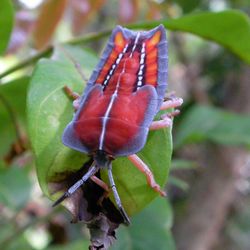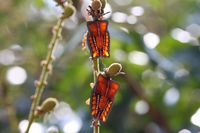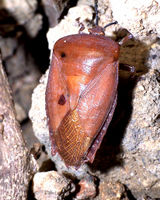Difference between revisions of "Tessaratoma papillosa"
| (One intermediate revision by the same user not shown) | |||
| Line 1: | Line 1: | ||
| − | {{ | + | {{TaxLinks|LnkTessaratoma}} |
{{LiteratureDB|{{PAGENAME}}|browse,crops,benefialsN}} | {{LiteratureDB|{{PAGENAME}}|browse,crops,benefialsN}} | ||
| − | [[File: | + | [[File:Tessaratoma papillosa nymph (cropped).jpg|250px|thumb|''Tessaratoma papillosa'' nymph (click on image to enlarge it)<br/>Source: [http://commons.wikimedia.org/wiki/File:Tessaratoma_papillosa_nymph_(cropped).jpg Wikimedia Commons]]] |
| − | <font color="#800000">'''''Tessaratoma papillosa'''''</font> (Drury) - (litchi stink bug) | + | <font color="#800000">'''''Tessaratoma papillosa'''''</font> (Drury, 1770) - (litchi stink bug) |
| − | + | ||
| + | This plant bug is native to parts of southern Asia from India to parts of southern China. It is invasive in Taiwan, where it has been first recorded in 1997 and has become a serious pest of a number of fruit trees. In particular, it sucks the shoots and young fruits of litchi, longan and citrus, causing flower drop, damaged fruits, including premature fruit drop, and wilting of twigs. | ||
| + | |||
| + | The damages can result in 20–30% yield losses on litchi and longan, sometimes up to 80% in severely infested areas. In addition, it is a public health hazard because it excretes a defensive substance which irritates the human skin and can even cause temporary blindness when coming in contact with the eyes. On the other hand, the bugs are consumed as food in some parts of Asia. | ||
| + | |||
| + | There is one generation per year with eggs being laid in early spring and adults emerging in late summer or autumn. It overwinters in the adult stage. The adults are 25-30 mm long. | ||
| + | |||
<gallery widths=200px caption="Other images of Tessaratoma papillosa (Wikimedia Commons - click to enlarge)"> | <gallery widths=200px caption="Other images of Tessaratoma papillosa (Wikimedia Commons - click to enlarge)"> | ||
| − | File:Tessaratoma papillosa | + | File:Lychee Stink Bug Nymph (Tessaratoma papillosa) (5780333759).jpg|nymphs |
File:Tessaratoma papillosa adult.jpg|adult | File:Tessaratoma papillosa adult.jpg|adult | ||
</gallery> | </gallery> | ||
[[Category:Tessaratoma (genus)]] | [[Category:Tessaratoma (genus)]] | ||
Latest revision as of 18:34, 25 November 2020
| Literature database |
|---|
| 13 articles sorted by: |
| • year (recent ones first) |
| • research topics |
| • countries/regions |
| • host plants |
| • list of natural enemies |
Tessaratoma papillosa (Drury, 1770) - (litchi stink bug)
This plant bug is native to parts of southern Asia from India to parts of southern China. It is invasive in Taiwan, where it has been first recorded in 1997 and has become a serious pest of a number of fruit trees. In particular, it sucks the shoots and young fruits of litchi, longan and citrus, causing flower drop, damaged fruits, including premature fruit drop, and wilting of twigs.
The damages can result in 20–30% yield losses on litchi and longan, sometimes up to 80% in severely infested areas. In addition, it is a public health hazard because it excretes a defensive substance which irritates the human skin and can even cause temporary blindness when coming in contact with the eyes. On the other hand, the bugs are consumed as food in some parts of Asia.
There is one generation per year with eggs being laid in early spring and adults emerging in late summer or autumn. It overwinters in the adult stage. The adults are 25-30 mm long.
- Other images of Tessaratoma papillosa (Wikimedia Commons - click to enlarge)


